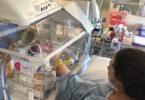Infections during pregnancy may be the risk factor…
Pregnancy is a difficult time for many women. Not only are they going through physical changes (there’s something growing inside them!), but their hormones are in serious fluctuation. Many pregnant women experience a variety of health problems—everything from gestational diabetes to acid reflux to an increase in yeast infections. All of these things that can affect the health of the child as well as the mother, so it’s vital to take steps to protect your health during pregnancy.
According to a new study, there may be one more threat to your child’s wellbeing: herpes. A herpes infection during pregnancy may actually contribute to a higher risk of autism in the child.
The journal mSphere published a study that examined the dangers of various diseases and infections to the child’s health. More than 440 mothers of ASD children participated in the study, and they were studied for immunoglobulin (IgG) antibodies to a variety of diseases: rubella, cytomegalovirus, toxoplasma gondii, Herpes Simplex 1, and Herpes Simplex 2.
The research found that mothers with higher immunoglobulin antibodies to HSV-2 were associated with a higher risk of autistic children. An increase in herpes antibodies led to a visible increase in ASD risk. None of the other diseases were linked to an increase in autism risk, only herpes simplex 2—also known as genital herpes.

READ MORE: 5 Weird STDs That’ll Make You Abstain
Interestingly enough, it’s not the virus itself that’s causing the problem. The body has developed antibodies to fight off the infection, and it’s those antibodies that are linked to the higher autism risk. The antibodies end up disrupting the development of the fetus’ central nervous system, which is one of the main risk factors for autism. By protecting you, your body could actually be doing harm to your child.
This is just the latest of infectious agents that have been linked to autism disorders. One study from 2013 showed that women who suffered the flu during their pregnancy had twice the chance of their child developing autism. Mothers with a fever that lasted for more than a week had a risk three times higher of their child being autistic.
But again, it’s not the infection or disease that’s causing the autism; it’s the body’s response to it. The antibodies produced to fight off the invading virus or pathogens end up interrupting the development of the child’s central nervous system. The result is a higher risk of autism.
If you suffer from HSV-2, it’s vital that you take care of your health. Herpes is an infection that has no cure, but it can be managed. By avoiding excessive friction to the genitals, you can avoid triggering the irritation that can cause a herpes flare-up. It’s also vital to keep your immune system strong, as a dampened immunity can lead to a flare-up of herpes.
However, be warned: one of the primary triggers for genital herpes is hormonal changes. That’s right, the sort of hormonal changes that are common during menstruation or pregnancy. These changes can lead to outbreaks in a herpes infection.
If you’re worried that your infection will cause health problems for your child, talk to your doctor about it. They may be able to recommend a course of treatment or lifestyle change that will help you to prevent herpes flare-ups during your pregnancy. That way, you’ll be able to prevent your natural response to disease from affecting your child’s brain. Taking extra care of yourself during pregnancy could reduce your child’s risk of autism drastically!








